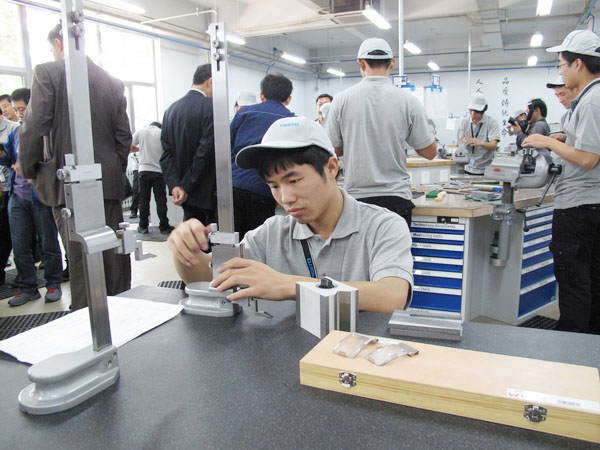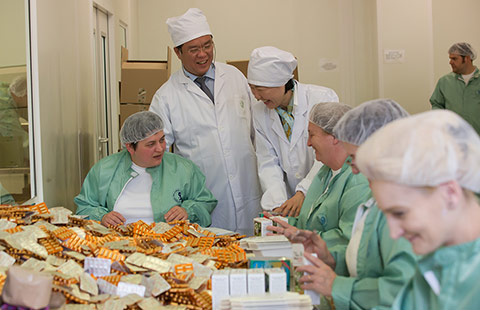Making it all work in the real world
By Zhang Haizhou (China Daily) Updated: 2012-11-09 16:22Beijing Hyundai, a joint venture established about a decade ago by the South Korean carmaker, is also now in partnership with Chongqing Lixin Vocational Education Center to train workers in the required skills.
Tan Sheng, a teacher in automobile repair at Lixin, says Germany's world leading global supplier of technology and services, Bosch, and the Japanese carmaker Toyota, have also set up classes there.
"More and more such programs have been set up in China in recent years."
The increasing prevalence of such projects highlights the growing importance China attaches to vocational education, but experts say there is still a long way to go before they can meet the demand from foreign companies.
|
 Apprentices practices at a training center of Festo (China) Production Ltd. [Photo/China Daily] |
These projects are just provisional measures taken by companies because there are no better options, says Feng Xiao, director of Tongji University's Institute of Vocational Instructors in Shanghai.
"The problem is how to address the loss of trained talent," he says, referring to the exodus of many skilled workers to other companies.
In Festo's case, apprentices have signed a contract to work at the company for at least three years after graduation.
Buschfeld, of the AHK in Shanghai, points out the limits foreign firms face when signing contracts with their apprentices. She says there is "no status of apprenticeship" in China's labor laws, so the contracts are not strictly binding.
She says this is a major challenge for her organization when promoting "dual education" in China.
Another drawback, Buschfeld says, is the perceived quality of the country's vocational training system. Normally, the better performers in the annual national college entrance exam go to universities, while those with lower grades turn to vocational colleges.
Buschfeld also sees the low respect paid to blue-collar work as a hurdle to promoting vocational education in China. In Germany, she says, many company bosses started off as apprentices.
However, she remains optimistic about promoting German-style vocational education in China, because "Chinese leaders are so open-minded" now and the "mind of the people has changed a lot".
Festo apprentice Wu is also optimistic about his future, especially since his first job is already secured.
"No matter what position I finally get here after I graduate, I'll be diligent and try my best to win promotion. Going to Germany? That will always be my target."
Cecily Liu contributed to this story.
zhanghaizhou@chinadaily.com.cn
- Big Data Expo 2016 opens in Guiyang
- Qualcomm says it's here to stay in China
- Belt and Road Initiative connects Chinese capabilities with UK expertise
- New Third Board confirms two-way division
- China's wealth management sector 'should go more global'
- Dell has big ideas for cloud computing in China
- Miracle of WeChat takes hold of tech-savvy news gatherers
- Chinese companies buy into Italian media rights group

















